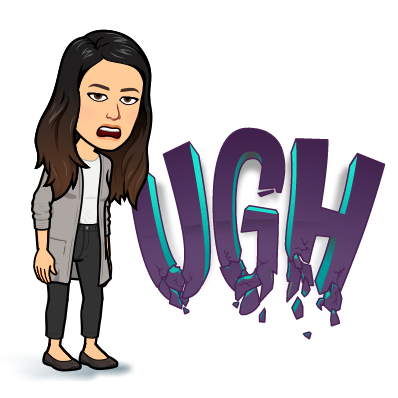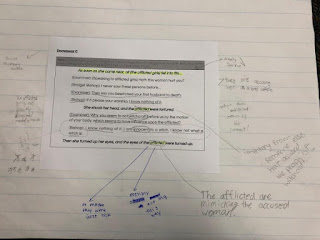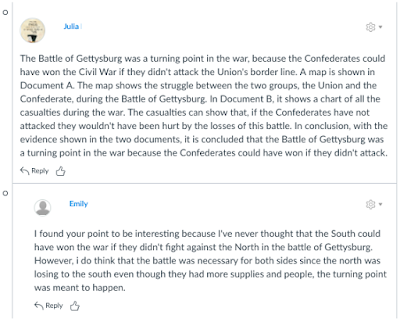My Thoughts on the DBQ Essay
 D-B-Q. Once those three letters are uttered, you don't only hear the collective groan, you feel the life sucked out of each and every student in the classroom. Too often, DBQs are associated with essays which creates so much anxiety and stress. DBQ essays are typically written in high school, especially AP history classes. As a middle school teacher, I try to practice document analysis and essay writing as practice for high school. However, forcing middle school students to write DBQ essay after DBQ essay truly is torture. Not every student of mine will take a high school history AP course and being able to write a DBQ essay is not going to get them a job one day. Instead, I've chosen to focus on the document analysis, critical thinking, and writing skills that will help them be successful in middle school, high school, and beyond.
D-B-Q. Once those three letters are uttered, you don't only hear the collective groan, you feel the life sucked out of each and every student in the classroom. Too often, DBQs are associated with essays which creates so much anxiety and stress. DBQ essays are typically written in high school, especially AP history classes. As a middle school teacher, I try to practice document analysis and essay writing as practice for high school. However, forcing middle school students to write DBQ essay after DBQ essay truly is torture. Not every student of mine will take a high school history AP course and being able to write a DBQ essay is not going to get them a job one day. Instead, I've chosen to focus on the document analysis, critical thinking, and writing skills that will help them be successful in middle school, high school, and beyond.This isn't a complete bash on the value of writing DBQ essays. My students still complete at least one a year. The writing process is still very valuable and time is dedicated to refining that process for my middle schoolers. However, writing a full five-paragraph essay using a handful of documents takes time - a lot of time. Instead of all the days spent writing essays, I am able to practice specific skills more often and in many units having my students apply content knowledge to these skills.
That brings me to my three alternatives to the DBQ essay. I've switched to doing smaller lessons focusing on one or two skills that can support writing a DBQ essay but allows students to practice them more often and in different units. I have seen an improvement in my students' abilities to analyze documents, corroborate sources, make connections with content knowledge, draw conclusions, and communicate effectively through speaking and writing.
Three Alternatives to the DBQ Essay
- Group Document Analysis - students analyze documents in small groups using Google Docs and Google Drawings
- Flipgrid - students record themselves sharing their analysis of documents on Flipgrid
- Discussion Board - students share their written analysis of documents on a discussion board
Group Document Analysis
With every unit, I have my students practice document analysis skills on shared Google Doc. Each student is assigned a document to analysis and respond to. By doing this, students get to learn from each other and are able to assist each other in their groups. This allows all students to practice their document analysis skills in a low stakes and low stress setting. I have found this to be most helpful in exposing students to various documents. Some students are stronger readers than others while others tend to notice the details in maps and images. By giving students different documents in a group, it provides choice and options for them. Students can select the document they feel that they can be more successful with or help their peers. This not only helps them practice this skill, but helps build confidence among my students when it comes to reading difficult text - which is most primary sources in medieval history.
For shorter documents, I like using Google Drawings so students can insert images or emojis in addition to underlining or highlighting text. For emojis, I like using Emojipedia.
A low tech alternative for group document analysis is using poster paper and passing it around to different groups of students to build upon. This strategy is also great for supporting students that struggle with literacy since they can read what other students have written and annotated.
Flipgrid
I love being able to hear my students articulate their thoughts orally. Flipgrid allows students to create a short (90 seconds for the free version) video using the webcam on a laptop, Chromebook, tablet, or phone. For DBQs, I have students recite their analysis out loud. The time limit requires students to be concise which helps them focus on what they're trying to say -- such an important skill in history writing. Also, what I discovered by using Flipgrid was that students who are weak in writing, can sometimes thrive by speaking their thoughts out loud. I found that some students were much more eloquent when speaking their document analysis rather than writing it. Flipgrid also is fun for students as they are able to take a selfie at the end and add images to their selfie. Lastly, it is very easy for me to quickly check their understanding by watching these short videos rather than reading 100+ paragraphs or essays. Win!Due to privacy concerns, I cannot share with you the videos of my students, but trust me, this is one of my favorite ways of assessing student document analysis skills.
Discussion Boards
To practice writing, I use discussion boards on Canvas, the LMS my school district uses. I like using discussion boards for students to respond to one another supporting their thoughts with documents. Also, students are able to read the different responses so they can see all the different ways to embed quotes, cite documents, and apply content to their responses. I have found that students get more confident in their writing after practicing on Discussion Boards. They also get feedback from their peers all while modeling appropriate discourse and using academic language.Other Alternatives to DBQs
Do you have other alternatives to writing DBQ essays in your classroom? I'd love to learn other strategies for practicing document analysis and writing/communication skills in class without having to write the full essay. Comment below or connect with me on Twitter!
**Update**
Since writing this blog, I've tried more alternatives to writing the DBQ essay and presented at CUE Rockstar History Edition at CCSS in March 2018. Check out my presentation below.









This is fantastic! Thank you so much for sharing. I am beginning DBQ for the first time this year, and I was a little reluctant with my "buy-in" You have relieved a lot of those fears.
ReplyDeleteYou're welcome! Let me know if you need more resources or have questions about the ones I've shared. :)
Delete